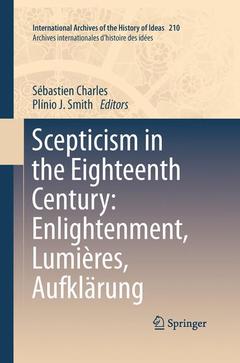Description
Scepticism in the Eighteenth Century: Enlightenment, Lumières, Aufklärung, 2013
International Archives of the History of Ideas Archives internationales d'histoire des idées Series, Vol. 210
Coordinators: Charles Sébastien, J. Smith Plínio
Language: English
Subject for Scepticism in the Eighteenth Century: Enlightenment...:
Publication date: 05-2015
Support: Print on demand
Publication date: 05-2013
381 p. · 15.5x23.5 cm · Paperback
Description
/li>Contents
/li>Biography
/li>Comment
/li>
First comprehensive book on the topic of the presence of scepticism in the Enlightenment by best experts in the field
Provides both a new, alternative conception of the Enlightenment and a detailed account of scepticism in all its forms in the Eighteenth Century
Wide coverage, from the very beginning of Enlightenment till its impact on the Nineteenth Century philosophy, as well as British, French, and German philosophy
Contains information on less known philosophers who are very important to the complete and proper picture of the topic ?




